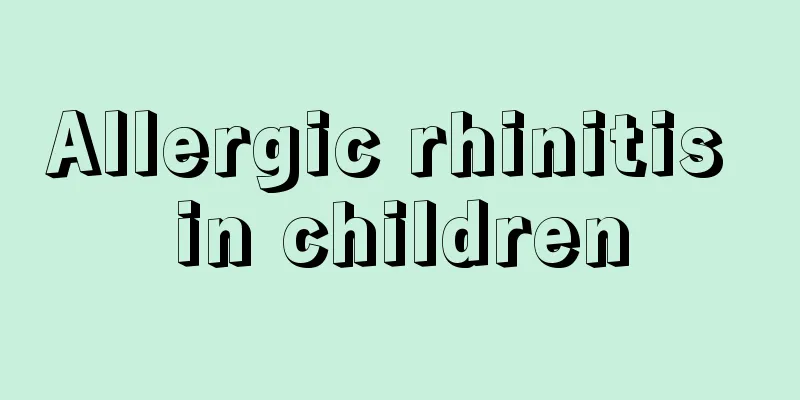What should I do if my baby has a runny nose and spit up milk? Parenting experts tell you the answer

|
Parents, please take note: if your baby has a runny nose and spit up milk, do not blindly judge the condition, and do not give your child random medicines. This situation is not very serious. Although parents are very anxious, they must treat it rationally. 1. Coughing can easily cause vomiting. When a baby has a cold, especially a viral respiratory infection, it can cause symptoms such as coughing. Coughing increases abdominal pressure and is often accompanied by vomiting. If you feed your baby at this time, it is very easy for him to spit up milk. Colds and coughs can cause the breathing rate to increase, which can lead to vomiting and regurgitation of milk. Therefore, you should pay attention to the coordination of breathing and swallowing when feeding. Never feed your baby when he is coughing or about to cough, so as to avoid vomiting. If you breastfeed at this time, in serious cases, the milk may spray out of the nasal cavity and damage the baby's delicate organs. 2. Be especially careful when feeding your baby when he has a cold. Do not feed too fast. Make sure the baby has swallowed the milk in his mouth before feeding him the next mouthful. Also try to feed him small meals frequently. Spitting up caused by incorrect feeding posture. The baby's stomach does not hang downward like that of older children and adults, but is horizontal. The stomach has a small capacity and can store less food, and the stomach contraction function is not fully developed, so vomiting up is easy to occur. Parents who do not understand the gastrointestinal characteristics of their baby may inadvertently increase the possibility of their baby spitting up milk while feeding. 3. It is recommended to hold the baby upright after each feeding and gently pat the baby's back to let out the air brought in during feeding, so as to avoid bringing out the milk when the air comes out. If the effect is not good, go to the hospital for examination as soon as possible. 4. It is normal for babies to spit up milk. Pick her up after feeding, rest her head on your shoulder and pat her back gently. If the baby spit up a lot, pat her more. Pat for about five minutes and then put her down. The main thing is to slap out the air she swallowed. Just burp her and she will be fine. Every baby is different. Some still vomit at ten months old, and even spit up food after eating. But generally they will be fine after ten months. There is nothing to worry about. Just take good care of her. 5. What is the cause of baby spitting up milk? 1. Disease factors: Vomiting may be a symptom of systemic or gastrointestinal diseases. If your baby loses weight rapidly due to spitting up, or coughs while spitting up, or the vomit is brown or green, or it is vomited in a jet shape up to 70-80 cm away, these are likely signs of a disease. Most babies are happy vomiters. If the baby vomits very uncomfortably, it is very likely that the esophagus is inflamed, and parents need to take the baby to the hospital for treatment in time. 2. Physiological factors: The anatomical and physiological characteristics of the infant's gastrointestinal tract make it easy for the baby to vomit up. This is because the cardia between the esophagus and the stomach has not yet matured, and the vomiting occurs due to the need to expel some mucous membrane remaining in the body. Spitting up due to physiological reasons is common. 3. Other reasons: The baby may also spit up milk because he eats too much and lies down immediately after feeding. This is all physiological spitting up, and parents don’t need to be too nervous. At the same time, be careful not to let your baby eat too much at one time. |
<<: What does phimosis mean in children?
>>: How to tell if a newborn is calcium deficient?
Recommend
What causes precocious puberty?
Children nowadays are spoiled by their parents, w...
What to do if your baby is underdeveloped
After the baby is born, it is the time when paren...
What should children supplement in spring?
No one likes winter. The long winter is finally o...
What to do if baby has less hair on top of head
The health of babies is a topic that people are m...
Can children drink fresh coconut milk?
Fresh coconut juice is fresher and more nutritiou...
Can a two month old baby sit?
Although two-month-old babies have adapted to lif...
White runny nose in child
It is quite common for children to have a runny w...
How to treat a baby with a bad stomach?
Most babies often suffer from diseases due to the...
Reasons why children have bad breath
Looking at the cute appearance of the baby, the m...
How to deal with baby's burns and broken skin
Babies are lively and active, and they are very c...
Why do children often have runny noses?
If a child often has a runny nose, parents should...
What are the symptoms of hand, foot and mouth disease in children?
Children are active and naughty, and have a stron...
How to treat viral myocarditis in children
Viral myocarditis in children is relatively commo...
What to do if baby has thick nasal discharge
The baby has a runny nose due to internal heat af...
Is bedwetting a disease in a nine-year-old child?
It is normal for infants and young children to we...









